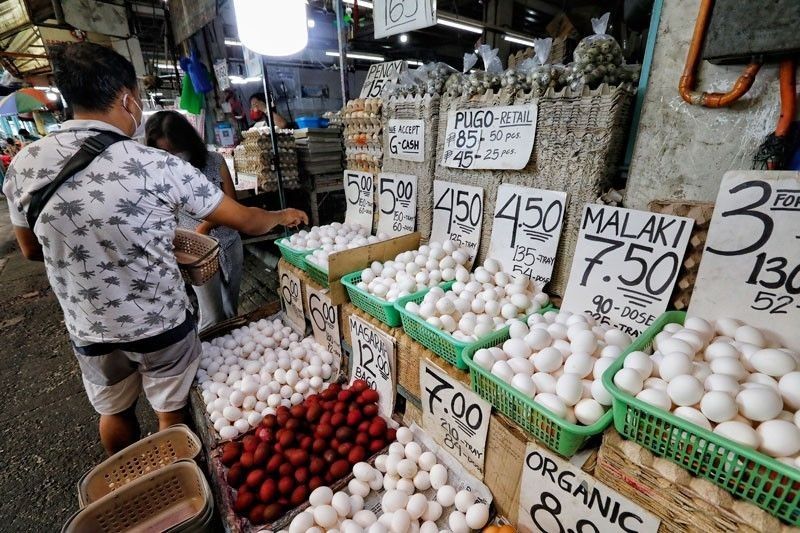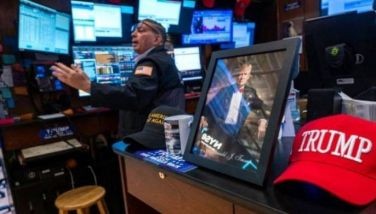Inflation likely quickened in September

MANILA, Philippines — Inflation likely accelerated in September as the peso slumped to record low levels, coupled with higher food prices and more expensive electricity, according to economists.
Bank of the Philippine Islands chief economist Jun Neri said inflation may have quickened to seven percent last month after easing to 6.3 percent in August from 6.4 percent in July.
He said major drivers include the surge in vegetable prices, significant uptick in electricity rates as well as the depreciation of the peso against the dollar.
Security Bank chief economist Robert Dan Roces said inflation in September likely settled at 6.9 percent with a range of 6.6 to 7.1 percent.
In terms of proportion to the headline reading, Roces said the food basket may have contributed approximately 2.8 percent, utilities by around 1.5 percent and transportation by 1.3 percent.
Roces said the core consumer price index (CPI) is also expected to have continued its upward trend last month.
“This means a mix of supply and demand side pressures are driving the inflation narrative as the peso’s depreciation bites into prices,” Roces said.
Amid the continued strengthening dollar due largely to the hawkish US Federal Reserve, major currencies in the region continued to weaken against the greenback.
The peso emerged as the second worst performing currency in the region, shedding as much as 15.7 percent to hit an all-time low of 58.99 to $1 on Sept. 27 from the end-2021 level of 50.999 to $1.
The local currency, however, gained some strength as it settled at 58.97 last Thursday and further to 58.625 last Friday as the Bangko Sentral ng Pilipinas (BSP) announced it would be more active in the foreign exchange market to smoothen the volatility.
Joseph Arogo, economist at Philippine National Bank, also believes inflation settled at 6.9 percent in September and is expected to pick up in the coming months.
“We assume that core inflation continued to accelerate and likely outweighed the easing of cost push pressure from non-core items, such as petroleum,” Arogo said.
Arogo sees inflation reaching 7.3 percent in the fourth quarter.
China Bank chief economist Domini Velasquez said inflation in September likely accelerated to 6.8 percent due to higher prices of key food commodities such as fish, vegetables and sugar.
Velasquez said electricity rates, particularly in areas serviced by Manila Electric Co. (Meralco) also increased.
The economist of the Sy-led bank also cited the depreciation of the peso that likely led to higher import costs.
“We think that these factors outweighed the declines in pump prices during the month. Our internal core estimate was also higher for September at 4.9 percent from 4.6 percent in August, suggesting broadening inflationary pressures,” she said.
According to Velasquez, the BSP is likely to raise interest rates by another 100 basis points before the end of the year as inflation is seen peaking only in October.
“Although inflation peak is in sight, likely in October, we expect domestic issues will continue to keep inflation elevated until the end of the year. Hence, we expect BSP to continue its aggressive monetary tightening cycle by another 50 bps each in November and December,” she said.
To tame inflation and stabilize the peso, the central bank has so far raised key policy rates by 225 basis points, bringing the benchmark interest rate to 4.25 percent from an all-time low of two percent.
Michael Ricafort, chief economist at Rizal Commercial Banking Corp., also believes headline inflation hit 6.8 percent in September and could peak at seven percent in October as the depreciating peso could lead to some pick up in overall inflation on the back of higher prices of imports.
Ricafort also noted that Typhoon Karding slammed Central and Northern Luzon, especially the biggest producers of rice, corn, vegetables, and other food products.
According to Ricafort, the latest round of transport fare increase, highlighted by the P1 hike in minimum jeepney fare effective by early October could still lead to some uptick in inflation.
“Thus, further local policy rate hikes could still be possible for the coming months, as supported by generally strong economic data; also as a function of future Fed rate hikes as well as the behavior of the peso exchange rate, going forward,” Ricafort said.
ING Bank senior economist Nicholas Mapa said there was a slight uptick in inflation to 6.5 percent in September from 6.3 percent in August.
“ The elevated commodity price environment has spawned second round effects while de anchored inflation expectations is now resulting in firms and households front loading their purchases in anticipation of higher prices down the line,” Mapa said.
The Dutch financial giant sees inflation remaining above seven percent for at least the next three months, prompting at least a100-basis-point rate hikes by the BSP.
“This is not 2021 when the economy was in deep recession. Resurgent demand and ill-timed supply shocks have driven inflation well past target, warranting tightening from monetary authorities.” Mapa said.
- Latest
- Trending





























